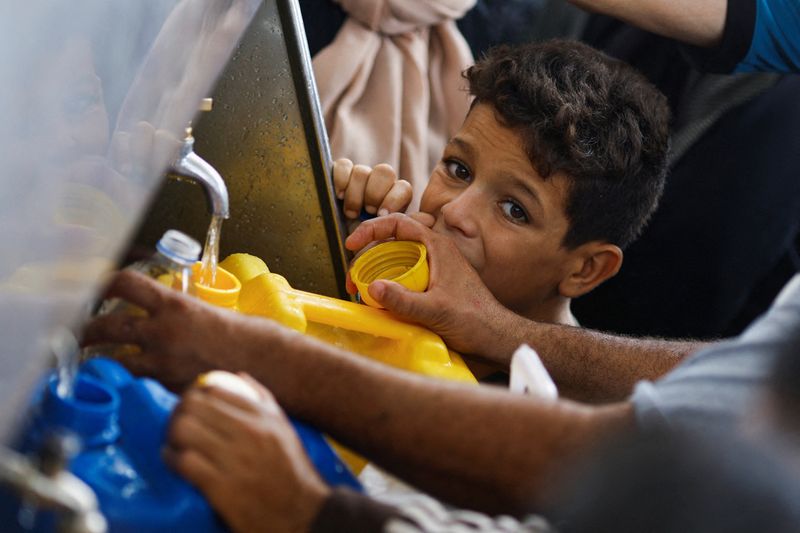Living conditions in Gaza turning grim under Israeli siege
2023.11.02 11:40
3/3

© Reuters. A child looks on as Palestinians gather to collect water, amid water shortages, as the conflict between Israel and Palestinian Islamist group Hamas continues, in Khan Younis in the southern Gaza Strip, November 2, 2023. REUTERS/Mohammed Salem
2/3
By Nidal al-Mughrabi
GAZA (Reuters) – Palestinians in Gaza sheltering from an intensifying Israeli bombardment that has killed thousands of people are running out of clean water and face growing health risks with public services at a halt and hospitals closing.
Israel has blocked off all power and fuel supply to Gaza and allowed in only a trickle of food and medicine as it presses its siege and invasion after Hamas’ cross-border attack on Oct. 7 in which 1,400 Israelis were killed and 240 taken hostage.
In Khan Younis, in the south of the tiny, crowded enclave, nine-year-old Rafif Abu Ziyada said she was drinking dirty water and getting stomach pains and headaches.
“There is no cooking gas, there is no water, we don’t eat well. We are getting sick,” she said. “There’s garbage on the ground and the whole place is polluted.”
Health authorities in the Hamas-controlled enclave said on Thursday Israeli bombardment has killed 9,060 people including 3,760 children, and put several hospitals out of service – even as a mounting ground offensive increases casualty numbers.
Civilians ordered by Israel to leave the northern half of Gaza but also under bombardment in the south are facing ever worse conditions despite the start of some aid deliveries through the Rafah crossing with Egypt last week.
“Water is being used as a weapon of war. Many people are resorting to unsafe sources of water…Clean water in Gaza is either unavailable or available in very, very small quantities,” said Juliette Touma, a spokesperson for the U.N. agency for Palestinian refugees UNRWA.
Israel initially severed all water supply to Gaza after Oct. 7 but says it has restored it in southern areas by reopening lines that provide 28.5 million litres of water a day.
Israeli military officials insist there is enough available water and other supplies for all Gazans and they were in touch with all U.N. agencies to track the humanitarian situation.
POLLUTED WATER
However, pumps to extract groundwater and desalination plants to treat seawater are out of order for lack of electricity. Tankers cannot move water by road without fuel.
“The water is salty. In normal days you wouldn’t give it to a donkey to drink. But nowadays you must drink it and let your children drink it,” said Ibrahim Al-Jabalawy, 60.
“There’s no medicine to treat them if they get sick from the polluted water,” he added.
Major hospitals, especially in the northern areas where shelling and fighting are heaviest, are closing because of power cuts, Gaza health authorities say, though Israel has said Hamas holds enough fuel to power them.
On Thursday, Israel’s army chief signalled willingness to ease its wartime embargo on fuel for Gaza Strip imposed over concerns Hamas could seize it, saying that if hospitals there run out they could be resupplied under supervision.
Hospitals that remain open are so full they are turning away some of the wounded and sick or asking them to leave before they are healed. Pharmacies are running out of medicine.
Basic sanitation is deteriorating with bags of rubbish piling up in the streets between mounds of debris from the rising number of bomb sites.
SPREADING DISEASE RISK
The population of densely populated Khan Younis, home to a 75-year-old refugee camp, has greatly swelled since hundreds of thousands of people left their homes in the north of Gaza in the teeth of Israel’s offensive.
Hundreds of displaced people cram into U.N.-run schools and hospital courtyards function as temporary shelters where people hope the bombardment will be less intense.
Garbage workers fear being out in the streets and are anyway unable to reach the main landfills near the frontier with Israel. People forage for firewood to cook depleting reserves of rice and vegetables, near mounds of rubbish.
Washing facilities have little water. Toilets get filthier every day. At Nasser Hospital in Khan Younis, people said they struggled to find a working toilet within hundreds of meters of the facility. Those they find are dirty.
Two doctors warned Reuters that there was a growing risk of skin problems such as scabies.
Jabalawy’s daughter is already getting painful rashes and itches on her skin. A pharmacist told him they were running out of suitable ointments and would be unable to replace them when stocks were exhausted.
“She is scratching all night and there is no medicine… What can we do? We have to tolerate it,” he said.
Outside a U.N.-run school operating as a shelter in Khan Younis, Majeda Abu Rjaila said the pollution and stink was so bad that she could not stand it during the day and would find a place away from the shelter to sit by a road.
“We sleep in dirt. We cover ourselves with whatever we can. We drink whatever we can, eat whatever we can,” she said.








